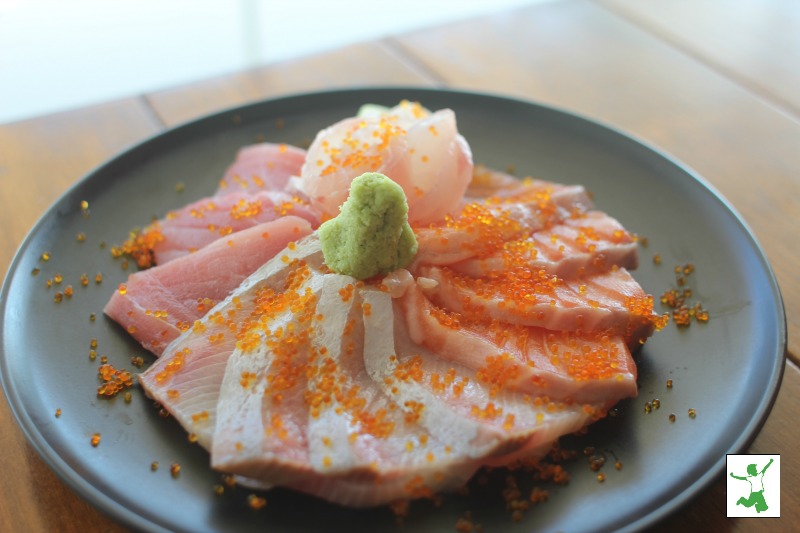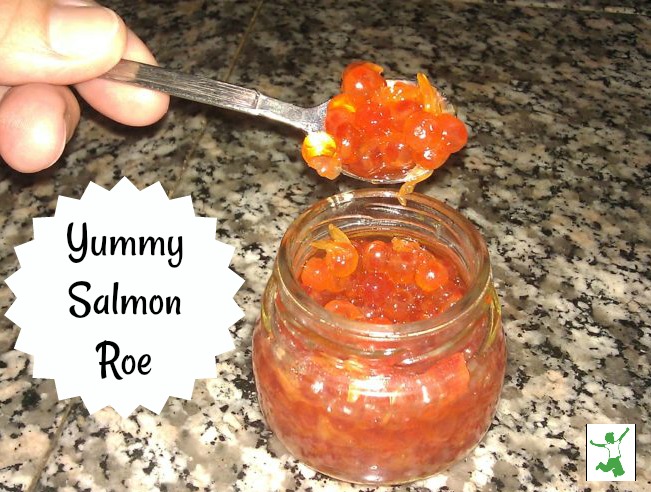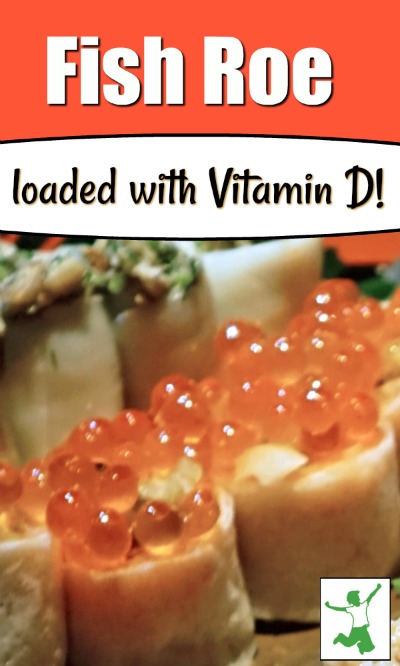Fish eggs are extremely high in vitamin D and a much safer and better choice than drops or pills for resolving this common nutritional deficiency. What to look for to source the highest quality roe with no additives.

Are fish eggs, also referred to as fish roe, a better choice than Vitamin D drops for resolving worrisome signs of vitamin D deficiency?
Vitamin D is surely the darling of supplements at the moment. More and more exciting news keeps coming out about this Wonder Vitamin and its beneficial effects in reducing the chances of many kinds of cancer, heart disease, and autoimmune disorders. The research is simply too groundbreaking to ignore.
I wrote a couple of posts last year about how the seasonal flu is really just Vitamin D deficiency disease and why I take a cod liver oil supplement every day even when I get good doses of midday Florida sunshine. I find the role of Vitamin D in the body and its ability to preserve health and reduce inflammation of all kinds very exciting.
Nearly 80% of People Deficient in Vitamin D
According to a study published by the peer-reviewed Archives of Internal Medicine, nearly 80% of Americans were deficient in this critical nutrient in 2009. Is it worse today? I would wager that it probably is given the advent of smartphones and less time spent outdoors! (1)
These numbers have even conventional doctors jumping on the bandwagon with more frequent testing. Supplementation is the solution commonly recommended when Vitamin D levels are too low to reap any health benefits.
While I think the enthusiasm over Vitamin D is wonderful, I personally do not feel comfortable with the casual way that high dose Vitamin D supplements are being recommended.
In some ways, it seems like Vitamin D has become just another drug!
Taking a single vitamin or nutrient in isolation is a practice that should be used with caution. This is especially true with Vitamin D, which is fat-soluble. Toxic blood levels from supplementation can and do occur.
For this reason, a food-based supplement that supplies Vitamin D is safer. In addition, a whole food source like high vitamin cod liver oil supplies not only Vitamin D, but also Vitamin A and other nutritional cofactors which work synergistically to prevent toxicity.
Watch out, though. Many cod liver oil brands are high-heat treated, which destroys the natural Vitamin D. Synthetic Vitamin D is added back after processing, but this fact is not indicated on the label.
Be sure to use only brands that do not heat the oil. This is the vetted and tested brand I use.
Vitamin D Foods and UVB Sunshine
What if your Vitamin D blood levels are so low that you can’t take enough cod liver oil each day to bring them up very quickly?
What if you live in a climate where getting a decent dose of midday UVB sunshine to produce Vitamin D via the skin is not an option for a substantial portion of the year?
Clearly, taking more than a teaspoon or two of cod liver oil each day to try and boost Vitamin D levels is not the answer in these situations.
Too much cod liver oil each day results in consuming too many omega 3 fatty acids. This can be just as bad as too little. Both scenarios can result in inflammatory conditions in the body.
In those instances, then, larger doses of Vitamin D are obviously required in addition to the daily dose of high vitamin cod liver oil.
However, there is a better and safer way to increase your Vitamin D blood levels quickly without those potentially dangerous high dose Vitamin D drops and pills!
Fish Eggs: Traditional Sacred Food to the Rescue
Fish eggs, also known as fish roe, were highly prized by the natives of South America who would sometimes travel hundreds of miles from their mountain villages down to the sea to procure it in dried form. This superfood was then provided to women of childbearing age to ensure healthy and robust babies and children.
The Eskimos also consumed fish roe from a number of fish species, particularly salmon. Fish eggs were dried for consumption during winter months and for special feeding to pregnant women.
How Much Vitamin D in Fish Roe?
It is no wonder fish roe was so highly prized by isolated natives.
According to an analysis carried out by the Weston A. Price Foundation, a single tablespoon of fish roe contains approximately 17,000 international units of vitamin D. (2)
In addition, fish roe contains vitamins A, K2, zinc, iodine, and the brain supporting omega 3 fatty acid DHA in ample amounts.
One tablespoon of fish eggs, then, supplies a similar amount of Vitamin D as a midday dose of Vitamin D on the skin!
Incidentally, one tablespoon of pastured lard clocks in at 10,000 IU of Vitamin D according to tests by the Weston A. Price Foundation. This healthy fat is a great alternative for those who are allergic to fish.
Synergistic Nutrients
Vitamin A and particularly Vitamin K2 work synergistically with Vitamin D to prevent toxicity and over calcification of the soft tissues, bones, heart, and/or kidneys, hallmark symptoms of Vitamin D overdose. The K2 can be the animal form (MK-4) or the fermented form (MK-7).
Given this information, doesn’t it seem much wiser to use fish eggs as that big Vitamin D boost rather than potentially dangerous and untested Vitamin D drops and pills?
The truth is that no one really knows what the long term effects of taking large doses of Vitamin D in isolation will be. Do you really want to be a guinea pig or do you want to use the safe and effective Vitamin D boost that the Eskimos and traditional mountain-dwelling tribes of South America used when sunlight was not a readily available option?
Where to Get Fish Eggs
I buy small glass jars of salmon roe at gourmet grocery stores for as little as ten to fifteen dollars.
The brand of fish roe I buy has only 3 ingredients: fish roe, salt, and water. Make sure the brand of fish eggs you choose does not contain any preservatives or colors added.
If you can find a fresh or dried source of caviar, so much the better!

How to Eat Roe
I love my salmon roe right off the spoon.
I eat 1/4 – 1/2 tsp in the morning with breakfast a few times a week. They are so salty and delightful. If you aren’t sure you like it at first, try it a few more times as roe can sometimes be a bit of an acquired taste.
If you simply can’t get used to fish eggs off the spoon, try some topped on whole-grain crackers with some creme fraiche.
Another option is to eat sushi! Many recipes for sushi rolls are topped with generous amounts of fish eggs.
Note that fish roe make great finger food for toddlers!
In my mind, fish eggs are a much superior – and delicious method for quickly raising and maintaining optimal Vitamin D levels.
What is your favorite way to eat fish roe? Do you like it off the spoon as I do?







I’m glad you just posted this. We are going to the beach in a week and I was thinking I won’t need to take my fclo since I’ll be out in the sun a lot. After reading this it sounds like I better take it. I haven’t tried fish eggs yet, but you have convinced to get some. I know over winter I don’t get enough sun so I’m glad fish eggs are the answer.
Hello Sarah,
I am pretty new when it comes to roe, but I would love to learn more about it so I can incorporate it into my family’s diet. Please excuse my few dumb questions:
~Is salmon roe (the kind that is orangy color) already “cooked”, or is it “raw”. Does it need to be cooked? Will that destroy any nutrients?
~Any suggestions about how to get kids to eat it? Has anyone tried the roe cakes recipe from nourishing traditions (pg. 316?)
Thanks in advance!
I tried her recipe for simple shad roe for the 1st time. It was a bit unusual but I think if I had it more often I would get to like it.
Haven’t tried fish eggs yet, just taking my FCLO and getting outside. Interesting though….
Hi Sarah,
Are Krinos and Castella good brands for fish roe? I’ve called Castella, and they’ve stated that their fish roe is unpasteurized and unprocessed.
Thank!
Hi, I’m not Sarah, but have been using Krinos for years. The only ingredient is carp roe. The Carp Roe Dip (Taramosalata) looks similar, but contains soy oil, so you have to be careful not to grab it by mistake as I once did.
This post did get me to wondering if it is ocean carp or farmed carp. I have an email into the company, but since you can label farmed seafood as wild, I’m not sure their answer will tell me much.
Thanks Emily! I can’t believe it is so hard to find wild caught fish now. How do we know if seafood and fish are truly wild caught?
Krinos just got back with me and they are freshwater carp. Bummer!!
We buy our shrimp, fish, fish heads, and oysters directly from a family-owned seafood market that has their own boats and we’ve seen the boats and spoken extensively with the family. Since you can’t rely on labeling, meeting the source is the only way I feel comfortable buying seafood.
I’m confused about the freshwater versus salt water thing. Carp is a freshwater fish, they do not live in the ocean. Will i not get sufficient vitamin D from carp roe because it is freshwater, or because it is farmed? What makes there not be sufficient vitamin D?
Salmon roe was one of my babies 1st finger foods. They love to grab the tiny eggs. Way better than cereal “O”‘s…Yuck!
Yesterday I was at our local Market Basket and saw a greek fish roe–this one uses carp roe. It was a good price, but didn’t know anything about carp, so I didn’t purchase. Do you know anything about carp roe, Sarah? Should I be looking for salmon roe in particular?
Hi Julie, I eat taramosalata (which is made of carp roe eggs, olive oil, onions, lemon and bread or potatoes during the fasting periods (half the year). It’s an excellent food and very tasty, too. Go for it!
Very timely here. Last night I added roe to my grocery order to be delivered tomorrow. I started GAPs and I plan to put them on some scrambled eggs.
The Roe you linked on Amazon is a farmed raised salmon. Wouldn’t that be bad?
For a while I was regularly snacking on brown rice crackers with creme fraiche and roe on them. Since I’m off dairy and grains as I transition into the body ecology diet, this is now out. I’ve been buying roe at Ikea, but they put extra junk in them. I’m going to be on the lookout for better quality roe now, in addition to writing to Ikea and chiding them for doing this to such a nutritious food.
Fish eggs are a terrific food. I have come to love the taste, and eat it right off the spoon just like you do.
Russians, who truly appreciate fish eggs, will eat them with plenty of butter on small pieces of toast, or cover them with sour cream. But many appreciate the fish eggs just by themselves.
It takes a while to get used to the taste, but you will come to love it, as your body learns how to absorb the wonderful nutrients.
Fish roe is delicious. I can eat it straight of the spoon, but I also like to sprinkle it on my eggs in the morning.